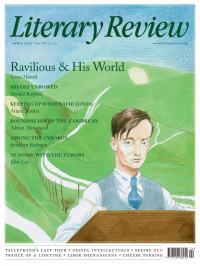Tim Stanley
There Will Be Blood
Killers of the Flower Moon
By David Grann
Simon & Schuster 338pp £20
The past is not just a foreign country in David Grann’s Killers of the Flower Moon: it is also a crime scene. Grann tells the story of the Osage Nation, a Native American tribe that struck oil in dirt-poor Oklahoma. By the 1920s, the Osage were reckoned to be the richest people on earth. They also became the most murdered.
They died by shooting, poisoning, even dynamiting. Several were probably killed by their own husbands or wives – white people who had married them for their wealth. This was no grand conspiracy, no industrial genocide like the one the Nazis orchestrated. It was casual murder. On the occasions when a culprit was caught and a jury was asked to convict a white person of killing an Osage, no one was quite sure what verdict to reach. A tribe member explained: ‘The question for them to decide is whether a white man killing an Osage is murder – or merely cruelty to animals.’
America’s treatment of its native population has been as cynical as it has been cruel. In 1804, Thomas Jefferson invited the Osage to the White House and called them his children, adding that he wanted them to regard the American nation as a friend and benefactor. ‘Within four

Sign Up to our newsletter
Receive free articles, highlights from the archive, news, details of prizes, and much more.@Lit_Review
Follow Literary Review on Twitter
Twitter Feed
Margaret Atwood has become a cultural weathervane, blamed for predicting dystopia and celebrated for resisting it. Yet her ‘memoir of sorts’ reveals a more complicated, playful figure.
@sophieolive introduces us to a young Peggy.
Sophie Oliver - Ms Fixit’s Characteristics
Sophie Oliver: Ms Fixit’s Characteristics - Book of Lives: A Memoir of Sorts by Margaret Atwood
literaryreview.co.uk
For a writer so ubiquitous, George Orwell remains curiously elusive. His voice is lost, his image scarce; all that survives is the prose, and the interpretations built upon it.
@Dorianlynskey wonders what is to be done.
Dorian Lynskey - Doublethink & Doubt
Dorian Lynskey: Doublethink & Doubt - Orwell: 2+2=5 by Raoul Peck (dir); George Orwell: Life and Legacy by Robert Colls
literaryreview.co.uk
The court of Henry VIII is easy to envision thanks to Hans Holbein the Younger’s portraits: the bearded king, Anne of Cleves in red and gold, Thomas Cromwell demure in black.
Peter Marshall paints a picture of the artist himself.
Peter Marshall - Varnish & Virtue
Peter Marshall: Varnish & Virtue - Holbein: Renaissance Master by Elizabeth Goldring
literaryreview.co.uk